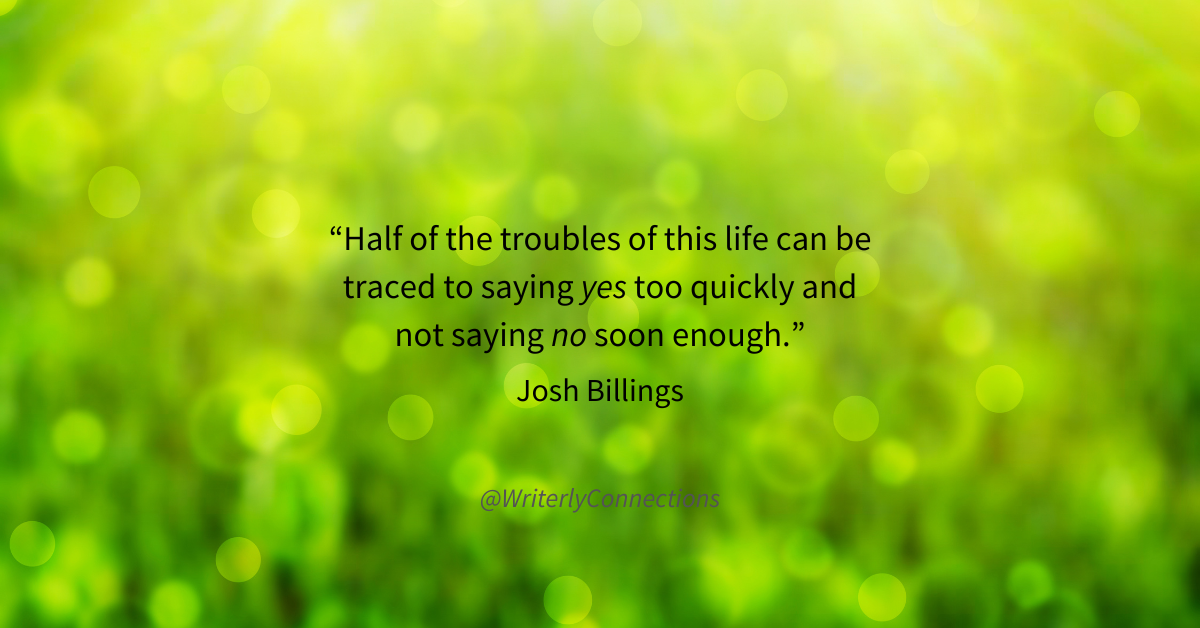At some point in our lives, we have all found ourselves in situations where we agree to something, only to regret it instantly. Whether it is overcommitting ourselves in our professional or personal lives or agreeing to something that doesn’t align with our priorities, saying yes has become a reflex response for many of us who struggle with saying no. Retracting a yes can often seem futile, like trying to undo something that has already happened. In a world where the pressure to say yes permeates every aspect of our lives, the ability to say no is an efficient tool for maintaining balance, autonomy, and mental well-being. From the workplace to personal relationships, the expectation to constantly accommodate the needs and wants of others can lead to a sense of overwhelm, burnout, and a loss of self. Being someone who used to struggle with saying no and nearly overcommitted her way to a nervous breakdown, I have come to realize that by embracing the power of no in a yes world, we can reclaim control over our time, energy, and priorities, fostering healthier boundaries and greater fulfillment in our lives.
“Focusing is about saying no.”
Steve Jobs, inventor
The False Glory of Busyness
Often, when I am hanging out with a friend or catching up with a former colleague, I have noticed that the response to the question, “How are you?” is often, “Busy,” elaborated further by spouting off a list of personal commitments, work projects, and social events that are monopolizing their time and energy. My view of the modern world is one that is characterized by a culture of busyness and productivity, where saying yes to every request is seen as a badge of honour. Part of the challenge is internal pressures and beliefs—society often equates busyness with worthiness, leading us to measure our value based on our level of productivity and achievement. I used to think that if you had time to write a to-do list, you weren’t busy enough. I always felt compelled to take on more than I could handle, fearing that saying no would be perceived as a sign of weakness or incompetence. Yet, what I didn’t realize back then was that by saying yes to everything and extending beyond my capacity, I framed myself for failure. As it turns out, I couldn’t do it all. I learned the hard way the reality of overcommitting oneself is decreased efficiency, increased stress, and ultimately, a diminished quality of work. Discerning opportunities that align with our goals and values and those that detract from them is essential for maintaining focus and achieving meaningful outcomes.
“You have the right to say no without feeling guilty.”
Manuel J. Smith, author
Unapologetic Boundaries
By setting boundaries, unapologetically, and learning to say no when necessary, we can cultivate healthier relationships based on mutual respect and understanding. Many of us struggle to assert our boundaries due to fear of disappointing others or causing conflict, but if we avoid confrontation in the short term, it can lead to greater discontent and resentment in the long run, so learning how to communicate assertively and respectfully is key to navigating difficult conversations and setting boundaries without damaging relationships.
Start using your boundaries as a reason for saying no. For example, you can say, “I’ve made a commitment to myself to prioritize my well-being, so I have to decline,” or “I appreciate the invitation, but I’m not able to attend due to [reason].” By expressing our needs and limitations honestly and directly, we can foster open and honest communication, leading to stronger, more authentic connections.
Not everyone will respect boundaries and some people may respond negatively to being told no, but like any skill, it gets easier with practice. When I was reprogramming myself to decline requests that exceeded my capacity or conflicted with my priorities, I started with smaller requests or situations and worked my way up to more challenging ones. Saying no can trigger feelings of guilt, inadequacy, or fear of missing out, but it is important to recognize that self-worth is not contingent on external validation or the ability to say yes constantly. Embracing self-compassion and prioritizing self-care can help us overcome these internal barriers and assert our boundaries with confidence and conviction.
“What you don’t do determines what you can do.”
Tim Ferriss, author
Saying No to Yes
By learning to say no to certain requests, we create more time for the things that truly matter. Perhaps there is an activity or hobby that you enjoy but are not actively doing because your current schedule doesn’t allow it. Take a moment to reevaluate what you’re saying yes to, and you might find that you can carve out time by saying no to something else. And it’s not about being selfish with your time and energy, it’s about knowing and respecting your limits and redirecting your time and energy to greater priorities. By practicing mindfulness and self-awareness, we can tune into our own needs and desires, making it easier to discern when to say yes and when to say no.
Some practical strategies that work well for me:
- Be clear and straightforward. A vague response can be misinterpreted as an agreement or a maybe. If I need time to think about it, I will let the person know that I will get back to them with my decision.
- Provide a brief explanation, depending on the situation, and avoid over-explaining.
- Express appreciation for the opportunity or invitation before declining and make it known that I value the relationship or the gesture.
These strategies are merely helpful suggestions. I remind myself that, in certain situations, strategies aren’t necessary when a simple no will do. There is a debate about the origin of this quote, but a wise person once said: No is a complete sentence.
So, go ahead and start saying no to make room for the things that truly matter to you.

